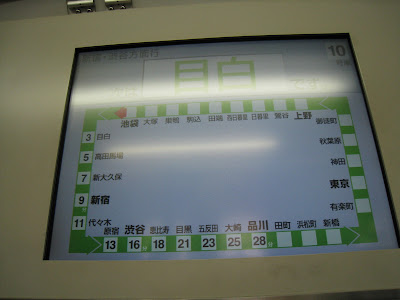Japanese people are famous for their incredibly polite manner, and when you visit Japan, the services you receive make you feel like kings and queens. No objections? I think not, which is why so many Hong Kong people love Japan.
What surprised me was that, I supposed the Japanese female casual fashion to lead the trend, but the truth is far from reality.
Harajuku 原宿 Fashion
from Locky's English Playground
In fact, most younger Japanese ladies wore pretty much the same clothes -- the same
blouses and skirts or dresses, and very different from my expectations, they were pretty
conservative in terms of dressing up.
Okay, how were they the same or conservative?
Well, if you look at the picture above, they wore at least 3 pieces of clothes (excluding undergarments) despite 34 degree Celsius of temperature. (I wonder how they handle this heat?)
It could be
- a thin inner blouse with an outer top and then a small denim jacket / a cardigan, or
- a thin inner blouse with a one-piece dress and a jacket.
What is definitely obvious to me was their fondness of
skirts-looking shorts. The shorts looked like a skirt from the first sight, but when the ladies walked, they looked like a pair of pyjamas pants cut short. ( See the girl in the middle of the photo above) That was definitely conservative.
And so it was very very hard to find a girl who dressed less than a girl does in Hong Kong (sorry to disappoint the guys), but this actually suggests that the Japanese girls are generally very well-trained by families,
well-nurtured with their cultural values and thus they are
decent ladies. (I guess the AV industry has just too much spread.)
Harajuku Fashion
from Locky's English Playground
But then of course,
"conservativity" also has its pros, especially during festivals with fireworks display, the elegant side of the Japanese traditional fashion unleashes to the fullest.
Japanese Lady in Yukata
from Locky's English Playground
Yukata 浴衣, a casual + summer version of
kimono 着物, is definitely the highlight of my trip to Japan as it was almost the only way for me to
distinguish Japanese ladies from the rest. I had always thought that kimono is one that has a huge
obi sash 帯 and Yukata has simply a belt, but after a little research, I know I was wrong. It is the materials used (cotton for Yukata, silk for Kimono) and the design.
Obi Sash around the waists
from Locky's English Playground
Simply looking at the different patterns of the Yukata was enjoyable and worthy enough. I wanted to go to Japan to see Japan as Japan. Had I seen Japan more or less the same as Hong Kong, I would have regretted it.
Yukata of lovely flowery pattens
from Locky's English Playground
from Locky's English Playground
Once I left the pop streets and back to the common places, everything was, sadly, rather similar to Hong Kong (except that all Chinese characters are replaced by Japanese ones, and the streets are 100 times cleaner). People dress pretty much the same as we do in Hong Kong, look pretty much the same as we do (which made it impossible for me to tell whether they were tourists from Hong Kong until they started speaking) ...
Ueno 上野
from Locky's English Playground
... they are as busy as people in Hong Kong (except much more polite and friendly)...
Tokyo 東京 JR Station
from Locky's English Playground
...and they take trains to go everywhere, just like us (except that they get to choose to take the faster trains with less stops but we don't)...
Ikebukuro 池袋 JR Station
from Locky's English Playground
So, what are you trying to say, Locky? Isn't that already very "different"?
Oh yeah! It is! So, I'm glad.
Vocabulary:
blouse -- (n)[C] a shirt for a woman or girl
conservative -- (adj) If you are conservative in your appearance, you usually do not like fashionable or modern clothes or hairstyles
nurture -- (vb)[T] Formal to take care of, feed and protect someone or something, especially young children or plants, and help them to develop
decent -- (adj) socially acceptable or good
"conservativity" -- (n) a word created by Locky, the noun of "conservative"
Yukata
Kimono
Obi sash
Resources:
http://en.wikipedia.org/wiki/Yamanote_Line
http://en.wikipedia.org/wiki/Yukata
http://en.wikipedia.org/wiki/Kimono
http://en.wikipedia.org/wiki/Obi_(sash)
http://dictionary.cambridge.org/dictionary/british/blouse
http://dictionary.cambridge.org/dictionary/british/conservative_1
http://dictionary.cambridge.org/dictionary/british/nurture_1#nurture_1__3
http://dictionary.cambridge.org/dictionary/british/decent

































